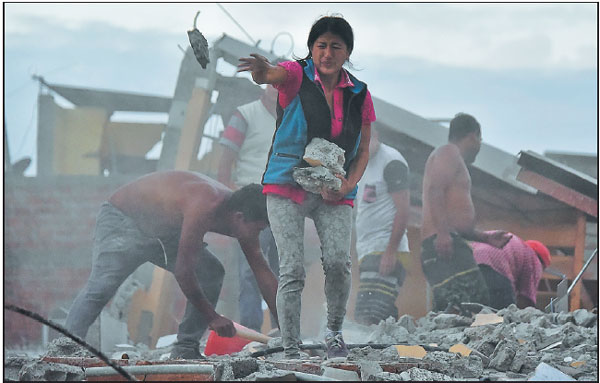In devastated Ecuador, loss piles up amid rubble
A heartbroken nation begins to grasp the severity of the worst quake to hit in years
It was supposed to be a family reunion to celebrate a young relative's start of college. But the gathering ended in tragedy when a collapsing building crushed 17-year-old Sayira Quinde, her mother, father and toddler brother in their rusting Chevy Blazer.
A grief stricken aunt, Johana Estupinan, now is making the longest journey of her life in a funeral hearse to the town of Esmeraldas, where she will bury her loved ones and break the news of the loss to her sister's three now orphaned children.
As Ecuador digs out from its strongest earthquake in decades, tales of devastating loss are everywhere amid the rubble. The 7.8-magnitude earthquake left a trail of ruin along Ecuador's normally placid Pacific Ocean coast, buckling highways, knocking down an air traffic control tower and flattening homes and buildings. At least 272 people died, including two Canadians, and thousands are homeless.
President Rafael Correa said early Monday that the death toll would "surely rise, and in a considerable way."
"The Ecuadorean spirit knows how to move forward, and will know how to overcome these very difficult moments," Correa said.
Portoviejo, a provincial capital of nearly 300,000, was among the hardest hit, with the town's mayor reporting at least 100 deaths. The Quinde family drove there from their home hours north up the coast to drop off Sayira at Estupinan's house a week before she was to start classes at a public university on a scholarship to study medicine.
"She was my favorite niece," Estupinan said, emotionally torn apart after waiting at the city's morgue for hours. "I thought I was getting a daughter for the six years it was going to take her to earn a degree."
"I never thought my life would be destroyed in a minute," she added.
Estupinan watched as her loved ones were loaded onto a truck-sized hearse for the nighttime drive, the three older ones in dark mahogany coffins and 8-month-old Matias in a casket painted white. "It was supposed to be a short moment of family happiness but it converted into a tragedy," she said.
She hoped to bury her relatives in Esmeraldas on Monday, but devastation there is also severe and she worried about whether the hearse could make it along roads torn apart by the quake.
The Saturday night quake knocked out power in many parts along the coast and residents who fled to higher ground fearing a tsunami had no home to return to, or feared structures still standing might collapse. With makeshift shelters in short supply, many hunkered down to spend a second straight night outdoors huddled among neighbors.
Correa, who cut short a trip to the Vatican, flew directly to the city of Manta from Rome to oversee relief efforts. Even before touching Ecuadorean soil he signed a decree declaring a national emergency. Speaking from Portoviejo late on Sunday he said the earthquake was the worst natural disaster to hit Ecuador since a 1949 earthquake in the Andean city of Ambato, which took over 5,000 lives.
"Our grief is very large, the tragedy is very large, but we'll find the way to move forward," Correa said. "If our pain is immense, still larger is the spirt of our people."
As rescuers scrambled through the ruins near the epicenter, in some cases digging with their hands to look for survivors, humanitarian aid began trickling in.
|
Ecuadorean Veronica Paladines removes debris in a frantic search for her husband in the Tarqui neighborhood in Manta, Ecuador, on Sunday. A powerful quake on Saturday killed at least 272 people and left more than 2,500 injured. Officials expect the death toll and number of injured to rise as rescue and recovery efforts continue. Luis Acosta / Agence France Presse |



















